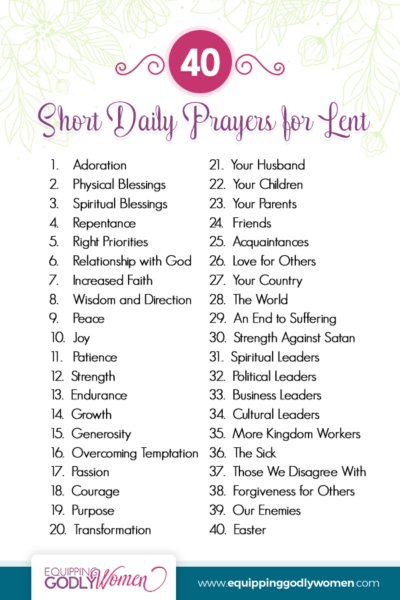40-Day Prayer For Lent
If you are feeling like giving up something for Lent, consider the spiritual value of this fast. In biblical tradition, fasting is a means of atonement, clearing the way for God’s meeting with mankind. In Exodus 34:28, we see that Moses fasted before he met God. Similarly, Lent is not just a “diet,” but an invitation to give up cravings that hinder our journey. Other temptations can include unforgiveness, jealousy, and more. By sacrificing this season, we can walk into the light.
Let go of anything that tempts you
Fasting for forty days can be a great way to purify your life and mind. Fasting for forty days may involve giving up certain foods, fasting from television, social media, and other distractions, or giving up a single meal each day. Fasting is a powerful way to dedicate your time to prayer and contemplation. In addition, giving up one meal a day can help you develop a regular prayer rhythm and practice quiet solitude. Regardless of what answer God gives you, your 40-day fast should be a time of peaceful contemplation and joy.
As you start your Lenten practice, you may want to read the Psalms. You may wish to consider using Praying the Psalms by Elmer Towns to guide you through these ancient prayers. Focus on the application of these verses. If you find one verse that speaks to you particularly, memorize it. This way, you can recite it over again throughout Lent.
Letting go of anything that tempts you during Lent can be an effective way to build deeper ties with God. As Christians, we can use the 40-day period to create a stronger sense of dependence on God and to deepen our prayer lives. We can start by letting go of anything that tempts us to sin. This way, we can gain a deeper relationship with God and walk into the light more fully.
Let go of jealousy, unforgiveness, or self-talk
As part of your Lenten sacrifice, identify a situation where you are dividing yourself from others. Commit to prayer on a daily basis, asking God for ways to bring healing and unity to your life. On Easter Sunday, reflect on how your prayer and actions have helped you to overcome this divide. Are you free of jealousy, unforgiveness, or self-talk?
Let go of anything that causes you pain
This forty-day prayer for Lent is a powerful way to spend time alone with God. In the quiet, you’ll see God as he really is, separated from everything else. You’ll hear God’s amazing, powerful voice and see that you are not alone. You’ll feel the peace of God’s presence as you hear the psalmist sing, “Let go of anything that causes me pain, and let me walk through this life with you.”
Letting go of food may seem difficult, but giving it up can be a powerful way to draw closer to God. Giving up your favorite foods for Lent is an act of atonement for our sins and will clear the way for God. You might think of fasting as a “diet”; however, it’s a way to let go of the things that cause you pain, from unforgiveness to jealousy. In a 40-day fast, you’ll sacrifice your cravings to walk into the light.
Let go of television on a “fast day”
For Christians, Lent is an important time of spiritual reflection, fasting, and prayer. Ash Wednesday, the beginning of Lent, is a symbolic beginning of the 40-day period. Lent is traditionally observed during the months of February and March. On Fridays, people refrain from eating, drinking, and watching television. On Mondays and Fridays, many people refrain from watching television entirely. Sundays are not considered fasting days and are reserved for the Resurrection of Jesus Christ.
During Lent, Christians imitate Jesus by giving up television for forty days. These forty days prepare them for the climax of Christ’s ministry, which occurs on Good Friday and Easter Sunday. By cutting out television and other forms of entertainment, they will be better equipped to focus on their faith and serve God. Throughout the 40-day season, Christians are invited to pray, fast, and give alms.
A 40-day Lenten fast offers a chance to re-discover the spiritual depth of the season. Fasting from worry, complaining, and unrelenting pressures can lead to a feast of gratitude and appreciation. You may also fast from personal anxiety and despair, and feast on God’s healing power. By letting go of these vices, you will have a richer spiritual life.
Let go of unforgiveness
As a Christian, you are called to spend time in prayer. During Lent, you can spend as much time as you need to meet with God and let Him lead you. If you are not able to connect with God, spend more time in the Word of God. Bible is the Living Word of God. Spend at least 30 minutes daily in quiet time to connect with God.
Lent is a time to sacrifice something you love or enjoy. The purpose is to draw closer to God, and this season is meant to be a time to be disciplined, charitable, and moderate. For some, that means giving up food. For others, it may mean denying themselves of other things they enjoy. But for many, this is an opportunity to let go of unforgiveness and other temptations in life. By choosing to give up food and alcohol for Lent, you’re making the sacrifice of walking into the light.
Let go of unforgiveness is an important step in healing. As we learn to be kinder to one another, we can forgive others more easily. During Lent, Christians can also become closer to God by praying for forgiveness. In fact, this prayer can be a part of your 40-day Lent devotion. It’s a time to reflect on the past and let go of unforgiveness.
Let go of self-talk
When you practice the forty-Day Prayer For Lent, it is imperative that you let go of self-talk. Even if it’s tempting to do so, try to focus on your goals rather than self-talk. When you focus on what you want to achieve rather than your goals, you are more likely to achieve them. Let go of negative self-talk during Lent and look to what you can gain by doing so.
When you let go of self-talk during Lent, you can deepen your relationship with Christ. Jesus modeled two of the most important commandments – love your neighbor as yourself. In the Bible, we are also taught to count others more important than ourselves. Try praying for someone else over yourself or listening to others more than your own needs. Try to do this for a week, and see what happens.
It is easy to talk negatively about others. It’s human nature to criticize, judge, and judge. We should also avoid the temptation to talk negatively about others. As Paul reminds us in Ephesians 4:29, we should only speak good things, fit for the occasion, and give grace to those we are talking to. During the forty-day prayer for Lent, we should refrain from all negative self-talk, and instead focus on positive self-talk.
Let go of jealousy
Lenten is a time to let go of your survival attitude. It requires trust and an open mind, but the experience is freeing. Here are a few steps to help you let go of jealousy:






